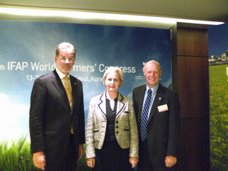Support to collective marketing systems of farmers in Burkina Faso (for ten years) has increased its scale and decreased vulnerability of the members. The combined support for agriculture productivity, marketing and for improved access to credit through the Union des Groupements pour la Commercialisation des Produits Agricoles de la Boucle du Mouhoun (UGCPA-BM) has been crucial for the success. The membership base is still relatively weak in terms of numbers however, and hasn’t been able to break the vulnerability circle of doing business individually with local private traders by a good part of the non members. Despite good progress, the cooperatives have not reached economic viability yet.
“In Burkina Faso, the Union des Groupements pour la Commercialisation des Produits Agricoles de la Boucle du Mouhoun (UGCPA-BM) brings together products from 1.550 small scale farmers (1050 women and 500 men). The marketing involves mainly dried grains, sesame and bissac. The success took off, thanks to an integrated economic approach which includes marketing and an annual credit line of 500 million CFA, strengthening of the warehouse systems and extension services to members. This has made them strong players in the market and allowed them to decrease farmers’ vulnerability to market fluctuations. UPA-DI is only one of 6 donor programs that UGCPA-BM benefited from and thus the success cannot be fully attributed to UPA-DI. An evaluation in 2006, points clearly out the advantages of being member of UGCPA-BM: by having direct payment when delivering grains to the warehouse; proximity of the warehouse; equipment to clean grains; possibility to sell small quantities of grains; possibility for supply during hunger periods. Also for Bissap there were important results. The production has increased from 1.6 tons in 1996 to 40 tonnes in 2007. The production is bio-certified with efforts of the organisation, which gives access to European markets and to better prices for the product. However, the membership is limited to about 1.500 farmers, meaning that the majority of farmers isn’t member of UGCPA-BM. Reasons of the relatively low membership numbers, are the fact that many of the farmers are still only producing for subsistence and don’t have surplus for the warehouse. Secondly, the fact that some farmers are bound to private traders, from which it is difficult to escape, limits membership. Another challenge is the financial sustainability of UGCPA-BM, not reached yet in 2006.”
Sunday, March 8, 2009
Subscribe to:
Post Comments (Atom)
Check these interesting contributions from other sites & blogs
- On Farmers Organization in Egypt
- Law on farmers Organizations in China
- Interview with FAO officials on Farmers Organizations
- Farmers use mobile phones
- comment of Kees Blokland on anti-CAP campaigning
- Poverty & growth blog of the World Bank
- Gapminder statistics visualized
- Guide for implementing ICT projects - iCommons december 2006
- Africa: tools of liberalisation - Patricia Daniel, University of Wolverhampton, England
- Business and the rural poor - Harvard Business School
- Profiling Asian Farmers Association members - Jan 4th, 2007
- Fiji Times report on AgriCord grants to Sugar Farmers - January 04, 2007
- Increasing Impact - marrying micro-credit and micro-insurance - The disconfort Zone, january 4th, 2007
- Programs that Fight Poverty - Institute for Advanced Technologies in Global Resilience - November 17, 2006
- University of Chicago Press Journals reports on GMOs - January 25, 2007
- Biotech crops to help reduce poverty - Kauser A Malik, in the Daily Times (Pakistan) January 25, 2007
- Why does China grow so fast - Michael Spence The Wall Street Journal 23 january 2007






No comments:
Post a Comment